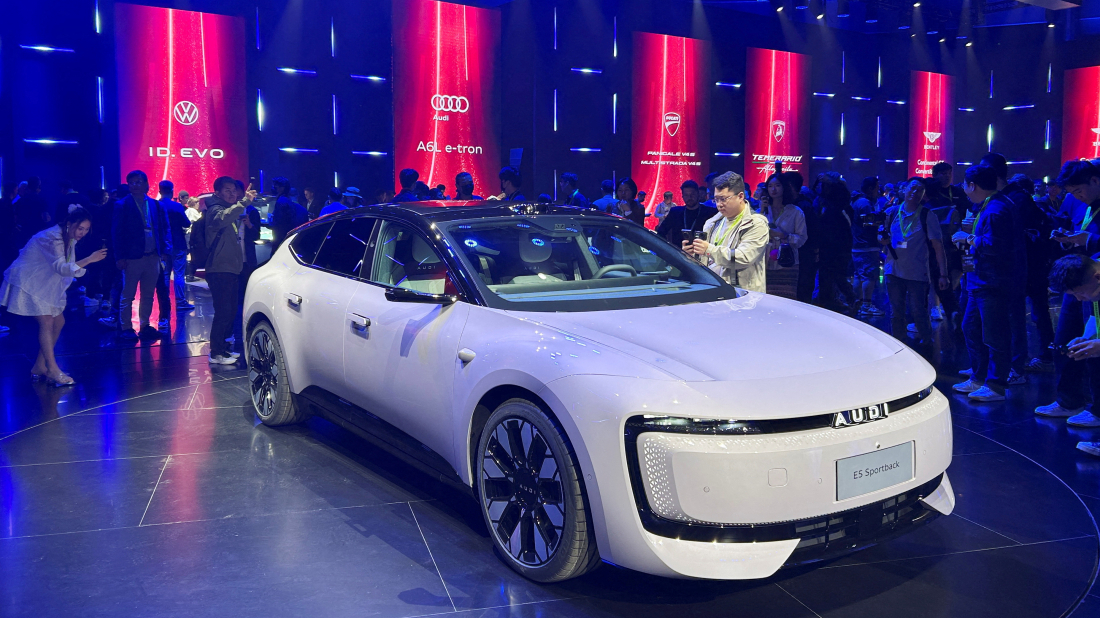The White House: U.S. ground troops ‘not part of plan’ in Iran
The White House says deploying United States ground troops in Iran is not currently part of the military strategy in ...

A high-level EU summit on Friday reaffirmed Europe’s commitment to electric cars, with the Commission holding firm on CO2 targets through 2035 despite industry calls for flexibility.
EU Commission President Ursula von der Leyen met with top automotive executives in Brussels for a three-hour “Strategic Dialogue” to discuss the sector’s future amid economic and environmental pressures.
An industry source told that the discussions confirmed a shared understanding: “No matter what, the future is electric,” while also noting that carmakers recognize the need to transition to zero-emission vehicles.
European manufacturers had called for more flexibility in CO2 target enforcement. Yet officials emphasized that the 2035 phase-out of combustion engine vehicles remains unchanged, as Brussels seeks climate neutrality by 2050.
Audi CEO Gernot Döllner said battery-electric cars are the best solution for reducing transportation emissions, warning that debates over combustion engines risk confusing consumers. Michiel Langezaal, CEO of Fastned and president of ChargeUp Europe, echoed the sentiment, highlighting the need for a growth mindset and coordinated action to lead the global e-mobility transition.
The sector faces challenges including falling sales, high energy costs, subsidized competition from China, and US trade tariffs. EU industry chief Stéphane Séjourné warned in April that Europe risks losing its global automotive leadership if structural issues are not addressed.
Sigrid de Vries, director general of the European Automobile Manufacturers’ Association, said battery electric vehicles still account for just 15.6% of passenger cars and 9% of vans in the EU-27. She stressed that widespread adoption depends on improved infrastructure, grid upgrades, and consistent incentives.
Carmakers argue that electric vehicles must become more attractive than combustion-engine cars, requiring purchase incentives, fair taxation, lower charging costs, and easier city access. Heavy-duty vehicle infrastructure, modernized grids, and reduced electricity prices are also key priorities.
The automotive industry remains central to Europe’s economy, employing over 13 million people and contributing around 7% of the EU’s GDP, making the success of the e-mobility transition critical for both climate goals and economic stability.
U.S. President Donald Trump said the U.S. military has enough stockpiled weapons to fight wars "forever"; in a social media post late on Monday. The remarks came hours before conflict in Iran and the Middle East entered its fourth day.
U.S. first lady, Melania Trump chaired a UN Security Council meeting on children and education in conflict on Monday (2 March), a move criticised by Iran as hypocritical following U.S. and Israeli strikes that triggered a UN warning about risks to children.
A torpedo from a U.S. submarine sunk an Iranian warship off the coast of Sri Lanka, U.S. Secretary of Defense, Pete Hegseth told reporters as the Iranian conflcit entered its fifth day on Wednesday.
The U.S. embassy in Riyadh was hit by two drones resulting in a limited fire and some material damage, the kingdom's defence ministry said in a post on X on Tuesday, citing an initial assessment.
Shahid Motahari Sub-Speciality Hospital in northern Tehran and parts of the Golestan Palace were bombed on day two of the U.S.‑Israel strikes. AnewZ Touraj Shiralilou is in Iran's capital city and said that the facility was flattened in an airstrike.
The death toll from heavy rains and flooding in Brazil’s Minas Gerais state has risen to 46, authorities said, with 21 people still reported missing. The storms triggered landslides and widespread flooding, displacing thousands across Juiz de Fora and Uba.
The administration of U.S. President Donald Trump on Thursday (12 February) announced the repeal of a scientific finding that greenhouse gas emissions endanger human health, and eliminated federal tailpipe emissions standards for cars and trucks.
Tropical Cyclone Gezani has killed at least 31 people and left four others missing after tearing through eastern Madagascar, the government said on Wednesday, with the island nation’s second-largest city bearing the brunt of the destruction.
Rivers and reservoirs across Spain and Portugal were on the verge of overflowing on Wednesday as a new weather front pounded the Iberian peninsula, compounding damage from last week's Storm Kristin.
Morocco has evacuated more than 100,000 people from four provinces after heavy rainfall triggered flash floods across several northern regions, the Interior Ministry said on Wednesday.
You can download the AnewZ application from Play Store and the App Store.

What is your opinion on this topic?
Leave the first comment